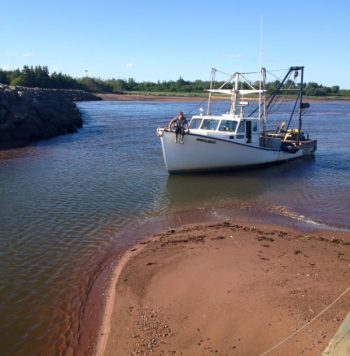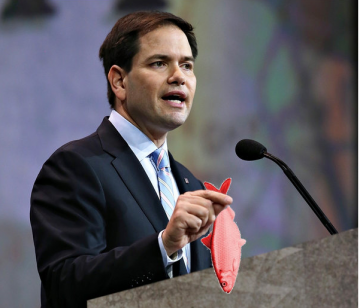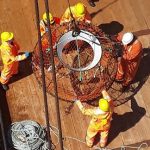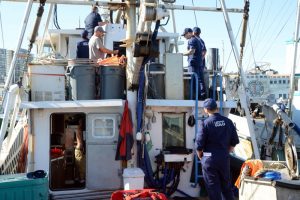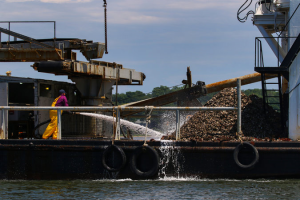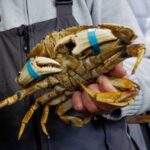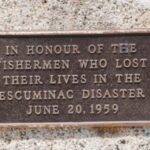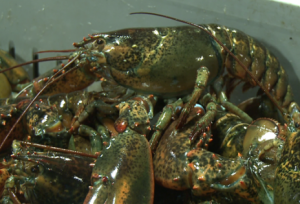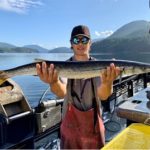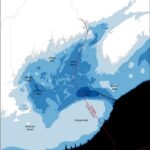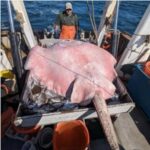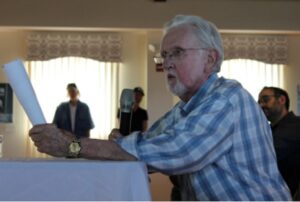Monthly Archives: July 2016
New England Fishery Management Council Report
 The Council Report summarizes major actions approved at NEFMC meetings or highlights items of interest. At its June21-23 meeting in Portland, ME, the Council approved actions related to the development of its fishery management plans. The issues involved: Sea Scallop FW 28 and the RSA Program, Small Mesh Multisp., Amendment 22. Industry-Funded Monitoring Amendment, Atlantic Herring Amendment 8 Groundfish FW 56 and the haddock catch cap for herring midwatertrawl gear, and Other Items of Interest Read the report here 07:06
The Council Report summarizes major actions approved at NEFMC meetings or highlights items of interest. At its June21-23 meeting in Portland, ME, the Council approved actions related to the development of its fishery management plans. The issues involved: Sea Scallop FW 28 and the RSA Program, Small Mesh Multisp., Amendment 22. Industry-Funded Monitoring Amendment, Atlantic Herring Amendment 8 Groundfish FW 56 and the haddock catch cap for herring midwatertrawl gear, and Other Items of Interest Read the report here 07:06
Press Release: Minister LeBlanc Accepts Key Recommendation of Advisory Panel on LIFO
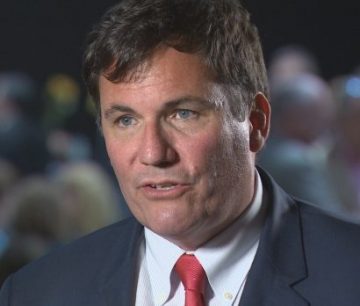 Today, the Honourable Dominic LeBlanc, Minister of Fisheries and Oceans and the Canadian Coast Guard, issued the following statement: “After a thorough review of the Ministerial Advisory Panel Report on the Northern Shrimp fishery’s Last in, First Out (LIFO) policy, I wish to confirm acceptance of its fundamental recommendation. The panel determined that after being in place for about 20 years, “LIFO is not a sustainable instrument of public policy,” and should be replaced by a system of proportional sharing for the future. Proportional Sharing is consistent with the approach used in most other Canadian fisheries with respect to stock and allocation management. Applying this principled approach of Proportional Sharing means that the inshore and offshore fleets as well as Indigenous Peoples will continue to share in the economic benefits of this precious resource. Sharing arrangements must also respect land claims agreements and the interests of Indigenous groups as well as the interests of adjacent coastal communities. Read the Press Release here 16:51
Today, the Honourable Dominic LeBlanc, Minister of Fisheries and Oceans and the Canadian Coast Guard, issued the following statement: “After a thorough review of the Ministerial Advisory Panel Report on the Northern Shrimp fishery’s Last in, First Out (LIFO) policy, I wish to confirm acceptance of its fundamental recommendation. The panel determined that after being in place for about 20 years, “LIFO is not a sustainable instrument of public policy,” and should be replaced by a system of proportional sharing for the future. Proportional Sharing is consistent with the approach used in most other Canadian fisheries with respect to stock and allocation management. Applying this principled approach of Proportional Sharing means that the inshore and offshore fleets as well as Indigenous Peoples will continue to share in the economic benefits of this precious resource. Sharing arrangements must also respect land claims agreements and the interests of Indigenous groups as well as the interests of adjacent coastal communities. Read the Press Release here 16:51
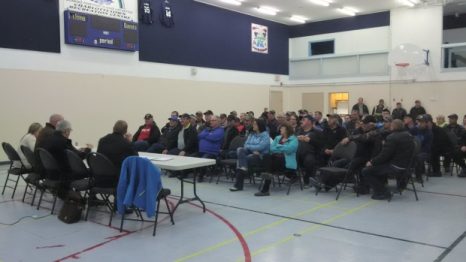
LIFO shrimp fishing policy has lit a new fire under some harvesters and communities in Labrador
People living south of Cartwright say part of the proposal would destroy their livlihood and undermine a processing plant in Charlottetown, Labrador. At issue is a recommendation by an advisory panel to the federal minister of fisheries and oceans to cut the shrimp quota in Area 5, just north of the zone where LIFO activity is centered, by 3,400 tonnes over three years. “The panel is recommending to the minister to take that 3,400 [tonnes] away from us and share it up among three different groups — the aboriginal, the offshore and the adjacent fishers and what they are calling the adjacent fishers is basically the 65-foot boats, shrimp boats from Newfoundland,” said Mervin Layden, who fishes out of Forteau. Layden said the recommendation came as a surprise. Read the story here 15:22
North Carolina Fisheries Association Weekly Update for July 5, 2016
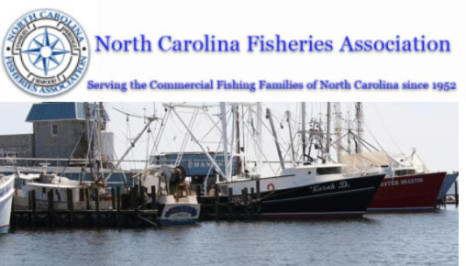 Click here to read the Weekly Update, to read all the updates, Click here 15:08
Click here to read the Weekly Update, to read all the updates, Click here 15:08
Summer flounder’s new status from “viable” to “concern”reduces allowable catch
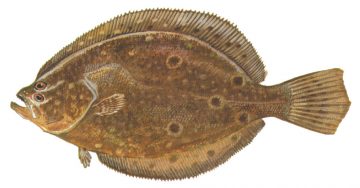 The stock status of most coastal fish did not change in the 2016 N.C. Division of Marine Fisheries Stock Status Report, but one species was reclassified from the 2015 report. Summer flounder moved from “viable” to “concern” based on a 2015 National Marine Fisheries Service Northeast Fisheries Science Center benchmark stock assessment for U.S. waters north of Cape Hatteras. The assessment indicated the stock of summer flounder was not overfished but overfishing was occurring, according to a NCDMF news release. As a result of the stock assessment, federal fisheries authorities lowered the allowable biological catch by 29 percent, which lowered the state-by-state commercial quotas proportionately. North Carolina receives the highest commercial quota share at 27.4 percent. Read the rest here – Read NCDMR Stock Assessment here 14:51
The stock status of most coastal fish did not change in the 2016 N.C. Division of Marine Fisheries Stock Status Report, but one species was reclassified from the 2015 report. Summer flounder moved from “viable” to “concern” based on a 2015 National Marine Fisheries Service Northeast Fisheries Science Center benchmark stock assessment for U.S. waters north of Cape Hatteras. The assessment indicated the stock of summer flounder was not overfished but overfishing was occurring, according to a NCDMF news release. As a result of the stock assessment, federal fisheries authorities lowered the allowable biological catch by 29 percent, which lowered the state-by-state commercial quotas proportionately. North Carolina receives the highest commercial quota share at 27.4 percent. Read the rest here – Read NCDMR Stock Assessment here 14:51
World’s Biggest Salmon Producer Wants to Farm Fish Inside a Cargo Ship
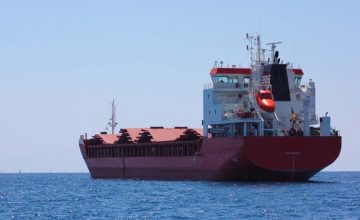 The world’s biggest Atlantic salmon producer wants to start farming fish inside a ship rather than the sea. Building traditional fish farms on the open water in Norway has become almost impossible because of state rules intended to curb outbreaks of sea lice, a parasite that can kill young fish. So raising salmon inside an unwanted cargo ship is one of a few options proposed by Marine Harvest ASA, which is trying to boost production at a time when prices are near a record high. Output in Norway, the top producer, is falling just as supply declines from the rest of the world. Employing a Panamax vessel better suited to carrying coal or steel was one of the responses to a Norwegian government program seeking ways to solve the parasite problem and stop farmed fish from escaping into the open sea. Winning proposals will get coveted farming licenses at reduced prices. Read the rest here 14:09
The world’s biggest Atlantic salmon producer wants to start farming fish inside a ship rather than the sea. Building traditional fish farms on the open water in Norway has become almost impossible because of state rules intended to curb outbreaks of sea lice, a parasite that can kill young fish. So raising salmon inside an unwanted cargo ship is one of a few options proposed by Marine Harvest ASA, which is trying to boost production at a time when prices are near a record high. Output in Norway, the top producer, is falling just as supply declines from the rest of the world. Employing a Panamax vessel better suited to carrying coal or steel was one of the responses to a Norwegian government program seeking ways to solve the parasite problem and stop farmed fish from escaping into the open sea. Winning proposals will get coveted farming licenses at reduced prices. Read the rest here 14:09
Athearn Marine Agency Boat of the Week: 45′ Fiberglass Lobster/Longliner 575HP John Deere
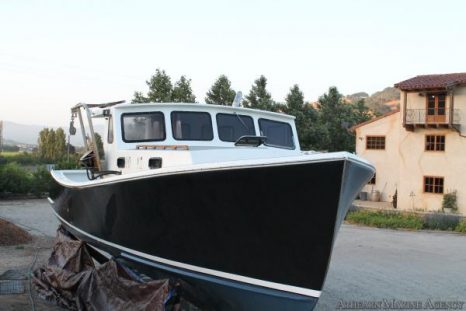 Specifications, information and 25 photo’s click here To see all the boats in this series, Click here 12:06
Specifications, information and 25 photo’s click here To see all the boats in this series, Click here 12:06
Herring bait shortage could pinch Maine Lobstermen
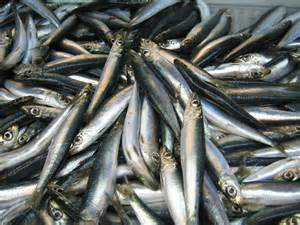 Maine regulators are considering intervening to help fix a bait shortage that threatens to affect its signature lobster fishing industry. Lobstermen typically use herring for bait, and regulators and members of the fishing industry say there’s a shortage of them. The shortage is happening at the time of year when lobster catches usually start to pick up — and just as New England’s high tourist season is arriving. The Maine Department of Marine Resources met Tuesday afternoon to discuss what role it can play. Meredith Mendelson, the deputy commissioner of the department, told The Associated Press before the meeting that the department anticipates passing rules at a later date based on Tuesday’s discussion. The problem is that not enough herring are being caught on Georges Bank, a key fishing area off Massachusetts, members of the fishing industry said. That means there could be more herring fishing closer to the shore, and fishermen could reach their quota for that area before the summer is out. Read the story here 08:47
Maine regulators are considering intervening to help fix a bait shortage that threatens to affect its signature lobster fishing industry. Lobstermen typically use herring for bait, and regulators and members of the fishing industry say there’s a shortage of them. The shortage is happening at the time of year when lobster catches usually start to pick up — and just as New England’s high tourist season is arriving. The Maine Department of Marine Resources met Tuesday afternoon to discuss what role it can play. Meredith Mendelson, the deputy commissioner of the department, told The Associated Press before the meeting that the department anticipates passing rules at a later date based on Tuesday’s discussion. The problem is that not enough herring are being caught on Georges Bank, a key fishing area off Massachusetts, members of the fishing industry said. That means there could be more herring fishing closer to the shore, and fishermen could reach their quota for that area before the summer is out. Read the story here 08:47
The Kenai Peninsula’s economy – Most of the employment is in commercial fishing
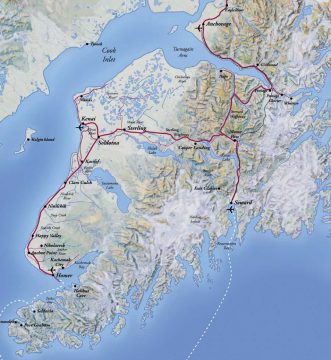 The Kenai Peninsula’s economy depends even more on the ocean and rivers than is apparent on paper. Some are obvious: fishing, shipping and marine fishing guiding all depend on the ocean directly. However, others — such as processing, oil and gas support services and fishing gear retailers — only “touch” the water and may not be counted on a cursory glance. When added together, about 3,400 people on the peninsula work in a maritime-related profession, the most of any sector in the region, according to the 2016 Situations and Prospects report from the Kenai Peninsula Economic Development District. The annual report, which provides data and forward-looking estimates on the economy for the Kenai Peninsula, details a growing maritime sector that paid approximately $177 million in wages in 2014, the most of any industry in the region. Read the rest here 08:32
The Kenai Peninsula’s economy depends even more on the ocean and rivers than is apparent on paper. Some are obvious: fishing, shipping and marine fishing guiding all depend on the ocean directly. However, others — such as processing, oil and gas support services and fishing gear retailers — only “touch” the water and may not be counted on a cursory glance. When added together, about 3,400 people on the peninsula work in a maritime-related profession, the most of any sector in the region, according to the 2016 Situations and Prospects report from the Kenai Peninsula Economic Development District. The annual report, which provides data and forward-looking estimates on the economy for the Kenai Peninsula, details a growing maritime sector that paid approximately $177 million in wages in 2014, the most of any industry in the region. Read the rest here 08:32
Arctic Nations to discuss controls for a potential Arctic fishery in international waters.
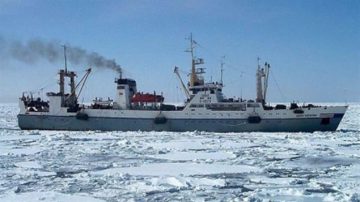 Arctic nations and several others will meet in Iqaluit in northern Canada this week to discuss controls for a potential Arctic fishery in international waters. The meeting takes place in Iqaluit, Nunavut, Canada from July 6-8. Since the beginning of human history, the central Arctic ocean has been frozen over and inaccessible to ships. With global warming and climate change, the Arctic ice has been retreating significantly and there are thoughts now that the international waters at the top of the world may soon be accessible by commercial fishing ships. Indeed in 2012, about 40 per cent of the central area was ice free. As it is considered international waters, the area is not currently regulated by any international fishing agreements. Plenty of Pew pablum. Read the rest here 16:41
Arctic nations and several others will meet in Iqaluit in northern Canada this week to discuss controls for a potential Arctic fishery in international waters. The meeting takes place in Iqaluit, Nunavut, Canada from July 6-8. Since the beginning of human history, the central Arctic ocean has been frozen over and inaccessible to ships. With global warming and climate change, the Arctic ice has been retreating significantly and there are thoughts now that the international waters at the top of the world may soon be accessible by commercial fishing ships. Indeed in 2012, about 40 per cent of the central area was ice free. As it is considered international waters, the area is not currently regulated by any international fishing agreements. Plenty of Pew pablum. Read the rest here 16:41
Macduff Shipyards completes and delivers ‘REBECCA FR 143’
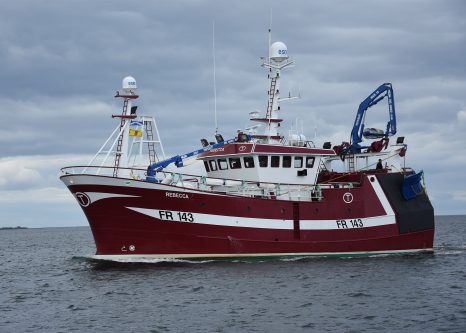 Macduff Shipyards Limited’s latest newbuild, ‘REBECCA FR 143’, has been delivered to Adam, Adam Junior and Jonathan Tait of Fraserburgh, UK. This is the third vessel built for the owners in less than 10 years and replaces their previous Rebecca, which was also built in the Macduff Yard in 2008. REBECCA is a new model of twin rig trawler from the yard, which incorporates numerous design changes to the hull form based on CFD research to improve efficiency whilst both trawling and steaming.The vessel has a double chine hull form with a bulbous bow and transom stern. With the exception of the wheelhouse and masts the entire vessel is built from Lloyds Grade A steel. Read the rest here 15:01
Macduff Shipyards Limited’s latest newbuild, ‘REBECCA FR 143’, has been delivered to Adam, Adam Junior and Jonathan Tait of Fraserburgh, UK. This is the third vessel built for the owners in less than 10 years and replaces their previous Rebecca, which was also built in the Macduff Yard in 2008. REBECCA is a new model of twin rig trawler from the yard, which incorporates numerous design changes to the hull form based on CFD research to improve efficiency whilst both trawling and steaming.The vessel has a double chine hull form with a bulbous bow and transom stern. With the exception of the wheelhouse and masts the entire vessel is built from Lloyds Grade A steel. Read the rest here 15:01
Shrimp slaves are a sign of the international seafood industry which we cannot compete with
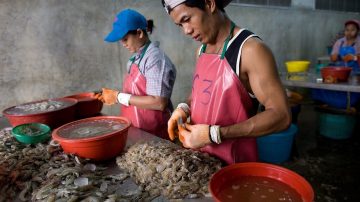 It’s been almost eight months since officials in Thailand raided a shrimp-peeling shed and freed dozens of Burmese slaves. Also last year, an investigation by The Associated Press led to the freeing of 2,000 slaves that were being held on an Asian island and being forced to process seafood that was on its way to Thailand and the U.S. The people who have been discovered and freed from those operations are in the minority. Far more remain in bondage, helping to produce the seafood that eventually makes its way into our nation. The fact is that much of the international seafood industry is fueled by slave labor and other unsavory practices. Our shrimpers cannot compete with industries that make widespread use of slave labor. Read the rest here 14:25
It’s been almost eight months since officials in Thailand raided a shrimp-peeling shed and freed dozens of Burmese slaves. Also last year, an investigation by The Associated Press led to the freeing of 2,000 slaves that were being held on an Asian island and being forced to process seafood that was on its way to Thailand and the U.S. The people who have been discovered and freed from those operations are in the minority. Far more remain in bondage, helping to produce the seafood that eventually makes its way into our nation. The fact is that much of the international seafood industry is fueled by slave labor and other unsavory practices. Our shrimpers cannot compete with industries that make widespread use of slave labor. Read the rest here 14:25
Seafood vendors in China selling ‘sewer shrimp and fish’
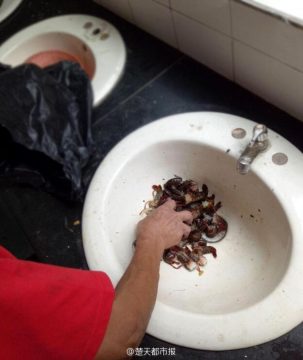 Internet users were horrified to find photographic evidence that showed seafood vendors in Wuhan, China scavenging discarded shrimp and fish from the city’s sewers to serve to unsuspecting customers. According to Shanghai List, it is not uncommon for shrimp and fish waste to show up in the City’s sewers. Seafood brought into the markets of Baishazhou in Wuhan frequently end up falling in the sewers during the packaging process. It can be assumed that once the fish and shrimp fall into the sewers, that should be the last anyone sees of them, but not in Wuhan. Apparently some vendors “rescue” the seafood and after rinsing it off in the public bathrooms, sell the seafood to unwary customers. Read the story here 12:53
Internet users were horrified to find photographic evidence that showed seafood vendors in Wuhan, China scavenging discarded shrimp and fish from the city’s sewers to serve to unsuspecting customers. According to Shanghai List, it is not uncommon for shrimp and fish waste to show up in the City’s sewers. Seafood brought into the markets of Baishazhou in Wuhan frequently end up falling in the sewers during the packaging process. It can be assumed that once the fish and shrimp fall into the sewers, that should be the last anyone sees of them, but not in Wuhan. Apparently some vendors “rescue” the seafood and after rinsing it off in the public bathrooms, sell the seafood to unwary customers. Read the story here 12:53
Thai seafood company to add N.B. lobster producer Chez Nous to its holdings
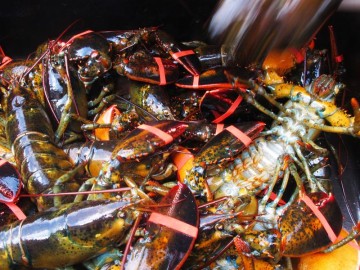 The Thai seafood company that owns Chicken of the Sea Frozen Foods is acquiring a majority stake in a Canadian lobster processor based in northeastern New Brunswick. Thai Union Group PLC didn’t disclose how much it will invest in Les Pecheries de Chez Nous but said its current chief executive, Francois (Frankie) Benoit, will retain a minority stake. Chez Nous has its office about 220 kilometres north of Moncton in the coastal community of Tracadie-Sheila, N.B. It employs up to 200 workers at the height of lobster season and generated $50 million in revenue in 2015, according to Thai Union’s announcement from Bangkok. Thai Union says its acquisition of Orion Seafood International in 2015 made it one of the largest sellers of North Atlantic lobster in the United States. It expects to solidify that position with the addition of Chez Nous. Link 12:26
The Thai seafood company that owns Chicken of the Sea Frozen Foods is acquiring a majority stake in a Canadian lobster processor based in northeastern New Brunswick. Thai Union Group PLC didn’t disclose how much it will invest in Les Pecheries de Chez Nous but said its current chief executive, Francois (Frankie) Benoit, will retain a minority stake. Chez Nous has its office about 220 kilometres north of Moncton in the coastal community of Tracadie-Sheila, N.B. It employs up to 200 workers at the height of lobster season and generated $50 million in revenue in 2015, according to Thai Union’s announcement from Bangkok. Thai Union says its acquisition of Orion Seafood International in 2015 made it one of the largest sellers of North Atlantic lobster in the United States. It expects to solidify that position with the addition of Chez Nous. Link 12:26
Marine ecosystems still at risk as ‘the blob’ sinks deeper below the surface, says DFO
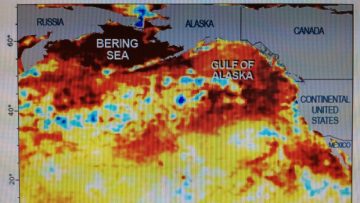 The giant ocean ‘blob’ isn’t dead — yet. The warm patch of water that stretches along the Pacific Coast is currently resting several hundred metres below the surface of the ocean, despite earlier reports that it had dissipated, according to new data. “What we’re finding is that the upper waters are being mixed by the wind again and coming back to normal temperatures, but the residual effect of the blob is still there at about 150 to 200 metres [below the surface],” said Ian Perry, a senior research scientist with Fisheries and Oceans Canada. The blob was widely pronounced dead earlier this year after satellite heat images no longer detected abnormally warm waters on the surface of the Pacific Coast. However, the imaging only read up to 40 metres below the surface, said Perry. Read the story here 11:31
The giant ocean ‘blob’ isn’t dead — yet. The warm patch of water that stretches along the Pacific Coast is currently resting several hundred metres below the surface of the ocean, despite earlier reports that it had dissipated, according to new data. “What we’re finding is that the upper waters are being mixed by the wind again and coming back to normal temperatures, but the residual effect of the blob is still there at about 150 to 200 metres [below the surface],” said Ian Perry, a senior research scientist with Fisheries and Oceans Canada. The blob was widely pronounced dead earlier this year after satellite heat images no longer detected abnormally warm waters on the surface of the Pacific Coast. However, the imaging only read up to 40 metres below the surface, said Perry. Read the story here 11:31
St. Anthony Mayor Ernest Simms says abolishing LIFO not good for St. Anthony economy
 Not everyone in Newfoundland and Labrador has been lobbying to abolish the Last in, First Out policy governing northern shrimp quotas. Now there is a fear in St. Anthony following the ministerial advisory panel’s recommendations. St. Anthony Mayor Ernest Simms says council is hoping Fisheries and Oceans Minister Dominic LeBlanc dismisses the recommendations put forward last week. He said those changes would be detrimental to the economy of the hub of the Northern Peninsula, and devastating to what St. Anthony Basin Resources Inc. (SABRI) has built in recent years. The organization was established in 1997 to manage a special allocation of 3,000 tonnes of northern shrimp for the northern part of the peninsula. The volunteer board is comprised of fishers, fish plant workers, and community and development committee representatives. The organization has agreements, including with two Icelandic companies,,, Read the rest here 11:20
Not everyone in Newfoundland and Labrador has been lobbying to abolish the Last in, First Out policy governing northern shrimp quotas. Now there is a fear in St. Anthony following the ministerial advisory panel’s recommendations. St. Anthony Mayor Ernest Simms says council is hoping Fisheries and Oceans Minister Dominic LeBlanc dismisses the recommendations put forward last week. He said those changes would be detrimental to the economy of the hub of the Northern Peninsula, and devastating to what St. Anthony Basin Resources Inc. (SABRI) has built in recent years. The organization was established in 1997 to manage a special allocation of 3,000 tonnes of northern shrimp for the northern part of the peninsula. The volunteer board is comprised of fishers, fish plant workers, and community and development committee representatives. The organization has agreements, including with two Icelandic companies,,, Read the rest here 11:20
Work on Atlantic Marine Monument not done yet, Eric Reid, North Kingstown, Rhode Island
 In June, House Natural Resources Committee Chairman Rob Bishop, a Republican U.S. Rep. Utah, visited New Bedford and spoke to several members of the industry regarding their concerns about a potential marine monument off the coast of New England. Following the meeting, I remarked to The Standard-Times reporter that a monument could potentially cost the industry up to $500 million in economy activity, in addition to countless jobs. This estimate has been criticized for being far too high. But it is based on two premises — a conservative estimate of the economic impact of fishing in New England, and the lack of clarity surrounding the marine monument discussion. Currently, the commercial fishing industry from Maine to New Jersey brings in an estimated $1.4 billion per year in landings. These landings support hundreds of millions of dollars more in economic activity for related and shoreside businesses, and employ tens of thousands of people up and down the coast. Read the rest here 08:18
In June, House Natural Resources Committee Chairman Rob Bishop, a Republican U.S. Rep. Utah, visited New Bedford and spoke to several members of the industry regarding their concerns about a potential marine monument off the coast of New England. Following the meeting, I remarked to The Standard-Times reporter that a monument could potentially cost the industry up to $500 million in economy activity, in addition to countless jobs. This estimate has been criticized for being far too high. But it is based on two premises — a conservative estimate of the economic impact of fishing in New England, and the lack of clarity surrounding the marine monument discussion. Currently, the commercial fishing industry from Maine to New Jersey brings in an estimated $1.4 billion per year in landings. These landings support hundreds of millions of dollars more in economic activity for related and shoreside businesses, and employ tens of thousands of people up and down the coast. Read the rest here 08:18
The ghost trap problem in Biscayne Bay
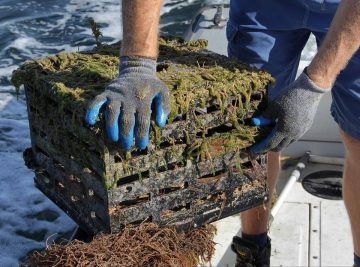 Beneath the glittering surface of Biscayne Bay, a menace lurks, wiping out fragile sea grass habitat, catching and killing as brutally, efficiently and indiscriminately as any monster from the deep: ghost traps. What goes inside the abandoned or lost traps stays inside — crabs left to cannibalize each other, baby lobster and fish too disoriented to escape. Heavy-grade plastic crab traps can even outlive their owners. “Just because someone’s not actually fishing a trap, it doesn’t mean the trap isn’t fishing,” said John Ricisak, a Miami-Dade County environmental resources project supervisor who heads county removal efforts. Ghost traps are so ubiquitous it’s hard to know how many exist. A 2013 study by the National Oceanic and Atmospheric Administration estimated more than 1.1 million ghost and derelict traps litter the Florida Keys. Read the rest here 19:29
Beneath the glittering surface of Biscayne Bay, a menace lurks, wiping out fragile sea grass habitat, catching and killing as brutally, efficiently and indiscriminately as any monster from the deep: ghost traps. What goes inside the abandoned or lost traps stays inside — crabs left to cannibalize each other, baby lobster and fish too disoriented to escape. Heavy-grade plastic crab traps can even outlive their owners. “Just because someone’s not actually fishing a trap, it doesn’t mean the trap isn’t fishing,” said John Ricisak, a Miami-Dade County environmental resources project supervisor who heads county removal efforts. Ghost traps are so ubiquitous it’s hard to know how many exist. A 2013 study by the National Oceanic and Atmospheric Administration estimated more than 1.1 million ghost and derelict traps litter the Florida Keys. Read the rest here 19:29
CETA on life support because of Brexit
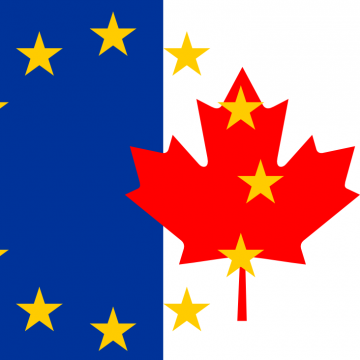 The Brexit vote has left Europe in a mess – and dealt a serious blow to Canada’s trade prospects. (CETA, Canadian fishery issues, click here) The British pound is dropping, world markets are scrambling and most are wondering how the political establishment will address what appears to be a constitutional vacuum related to exiting member-states of the European Union. It speaks to how ill-prepared the union was to such an eventuality. Yet the biggest casualty of Brexit will likely be global trading. And Canada may pay a huge price, since our Comprehensive Economic and Trade Agreement (CETA) with the EU is still under negotiation and won’t be ratified any time soon. And with so much uncertainty in agricultural policies particularly, CETA is undoubtedly on life support, at best. CETA emphasizes Canada’s relationship with the EU and was Canada’s greatest chance to become a significant portal between both continents. The United Kingdom is one of our top food trading partners within the EU and there was great potential to further increase trade in certain commodities. Read the rest here 13:55
The Brexit vote has left Europe in a mess – and dealt a serious blow to Canada’s trade prospects. (CETA, Canadian fishery issues, click here) The British pound is dropping, world markets are scrambling and most are wondering how the political establishment will address what appears to be a constitutional vacuum related to exiting member-states of the European Union. It speaks to how ill-prepared the union was to such an eventuality. Yet the biggest casualty of Brexit will likely be global trading. And Canada may pay a huge price, since our Comprehensive Economic and Trade Agreement (CETA) with the EU is still under negotiation and won’t be ratified any time soon. And with so much uncertainty in agricultural policies particularly, CETA is undoubtedly on life support, at best. CETA emphasizes Canada’s relationship with the EU and was Canada’s greatest chance to become a significant portal between both continents. The United Kingdom is one of our top food trading partners within the EU and there was great potential to further increase trade in certain commodities. Read the rest here 13:55
Atlantic Hurricane Season: What to Expect In 2016
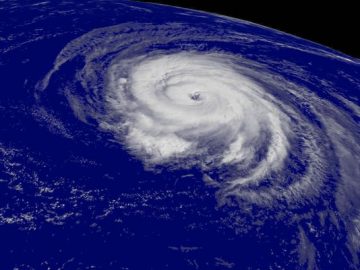 Colorado State University edged up its seasonal Atlantic hurricane forecast to 15, three more than in an average year. The new prediction is that six of those storms will become hurricanes and two will grow into major systems with winds of 111 miles (179 kilometers) per hour or more before the season ends Nov. 30. The total includes the four storms that have developed already this year. “I still think we are looking at a near-average season,” Phil Klotzbach, the forecast’s lead author, said in a telephone interview. Klotzbach said the influences contributing to storm development are “a pretty mixed bag.” Odds are rising that a La Nina, a cooling of the equatorial Pacific, will develop later this year. That can influence weather patterns across the world and make it easier for storms to form in the Atlantic by cutting down on wind shear that can rip storms apart. To offset La Nina’s influence, air pressure across the basin has been higher than normal through June and at least one model shows those conditions could persist through a large part of the season. Read the rest here 11:53
Colorado State University edged up its seasonal Atlantic hurricane forecast to 15, three more than in an average year. The new prediction is that six of those storms will become hurricanes and two will grow into major systems with winds of 111 miles (179 kilometers) per hour or more before the season ends Nov. 30. The total includes the four storms that have developed already this year. “I still think we are looking at a near-average season,” Phil Klotzbach, the forecast’s lead author, said in a telephone interview. Klotzbach said the influences contributing to storm development are “a pretty mixed bag.” Odds are rising that a La Nina, a cooling of the equatorial Pacific, will develop later this year. That can influence weather patterns across the world and make it easier for storms to form in the Atlantic by cutting down on wind shear that can rip storms apart. To offset La Nina’s influence, air pressure across the basin has been higher than normal through June and at least one model shows those conditions could persist through a large part of the season. Read the rest here 11:53
Farage to resign as UKIP leader after ‘Brexit’ vote
 Nigel Farage announced Monday that he will step down as the leader of the UK Independence Party, saying, “I’ve done my bit” to get Britain out of the European Union. He said the party was “in a good position” following the EU referendum and that his political ambition had been achieved. “I came into this struggle from business because I wanted us to be a self-governing nation, not to become a career politician,” Farage said. He declined to endorse a successor but said, “May the best man, best woman win.” It’s not the first time Farage has said he would resign as the UKIP’s leader. In 2015 he offered to step down after the election, but party members urged him to stay on. Read the rest here 09:05
Nigel Farage announced Monday that he will step down as the leader of the UK Independence Party, saying, “I’ve done my bit” to get Britain out of the European Union. He said the party was “in a good position” following the EU referendum and that his political ambition had been achieved. “I came into this struggle from business because I wanted us to be a self-governing nation, not to become a career politician,” Farage said. He declined to endorse a successor but said, “May the best man, best woman win.” It’s not the first time Farage has said he would resign as the UKIP’s leader. In 2015 he offered to step down after the election, but party members urged him to stay on. Read the rest here 09:05
Wildlife cops leery of ‘Finding Dory’ film – concerns of increased poaching in Keys National Marine Sanctuary
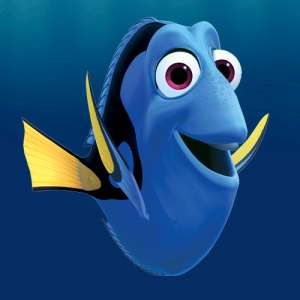 Over the last few years, federal law enforcement have arrested and convicted a slew of aquarium wildlife collectors in an operation dubbed “Operation Rock Bottom.” The Florida Keys National Marine Sanctuary and the reef are home to some of the most desirable tropical fish, coral, sharks and other wildlife for saltwater aquarium enthusiasts. Though the industry is regulated by state and federal law, the lure of quick and easy cash tempts traders to poach. Enter “Finding Nemo.” More than a decade ago, when Disney’s “Finding Nemo” animated film was released, law enforcement — mainly U.S. Fish and Wildlife Service and the National Oceanic and Atmospheric Administration — saw a spike in the collection of species made popular in the movie. Read the story here 12:12
Over the last few years, federal law enforcement have arrested and convicted a slew of aquarium wildlife collectors in an operation dubbed “Operation Rock Bottom.” The Florida Keys National Marine Sanctuary and the reef are home to some of the most desirable tropical fish, coral, sharks and other wildlife for saltwater aquarium enthusiasts. Though the industry is regulated by state and federal law, the lure of quick and easy cash tempts traders to poach. Enter “Finding Nemo.” More than a decade ago, when Disney’s “Finding Nemo” animated film was released, law enforcement — mainly U.S. Fish and Wildlife Service and the National Oceanic and Atmospheric Administration — saw a spike in the collection of species made popular in the movie. Read the story here 12:12
BASTARDS! Police doctored GPS data which saw fishing boat crew jailed for drug bust
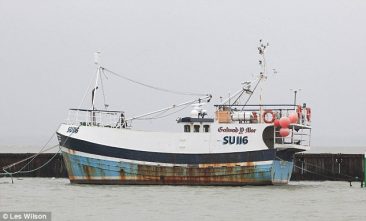 A police electronics expert made a clumsy attempt to ‘doctor’ vital evidence that led to the conviction of four fishermen and their friend for drug smuggling, according to legal documents seen by this newspaper. The five men were accused of picking up rucksacks containing 560 lb of cocaine worth £53 million in the middle of the English Channel, before dropping them overboard off the south coast of the Isle of Wight for someone else to recover. At their trial, data from the satellite tracking device on their boat, the Galwad-y-Mor, appeared to damn them. But new evidence shows that after officers from the Serious and Organised Crime Agency (Soca) seized the vessel’s Olex GPS machine, an officer tried to alter internal databases, apparently to make them conform more closely to the prosecution’s theory. And in another bombshell development, it can be revealed that the Galwad-y-Mor could not have dumped the drugs at the location alleged by prosecutors, because the water there is too shallow and the vessel would have run aground. Read the story here 10:21
A police electronics expert made a clumsy attempt to ‘doctor’ vital evidence that led to the conviction of four fishermen and their friend for drug smuggling, according to legal documents seen by this newspaper. The five men were accused of picking up rucksacks containing 560 lb of cocaine worth £53 million in the middle of the English Channel, before dropping them overboard off the south coast of the Isle of Wight for someone else to recover. At their trial, data from the satellite tracking device on their boat, the Galwad-y-Mor, appeared to damn them. But new evidence shows that after officers from the Serious and Organised Crime Agency (Soca) seized the vessel’s Olex GPS machine, an officer tried to alter internal databases, apparently to make them conform more closely to the prosecution’s theory. And in another bombshell development, it can be revealed that the Galwad-y-Mor could not have dumped the drugs at the location alleged by prosecutors, because the water there is too shallow and the vessel would have run aground. Read the story here 10:21
Northeast Ocean Plan would coordinate 20-plus federal agencies, Public comment period underway
 The Northeast Ocean Plan will offer a new system for federal agencies to look at each other’s data and gather more information from stakeholders like fishermen and shipping companies. The plan is a result of a 2010 executive order and is being facilitated in New England by the Northeast Regional Ocean Council. Similar plans are being crafted in the mid-Atlantic and West Coast regions.,, Anne Merwin, director of ocean planning at the political advocacy group Ocean Conservancy, said there are more than 20 federal agencies with jurisdiction over the ocean.,, John Williamson, who previously worked in the commercial fishing industry, said the new plan will be helpful for offshore stakeholders, especially fishermen. Offshore wind power, for example, has grown, and Williamson said it is expected to continue growing in the next 10 years. (it appears he has embraced this! http://www.seakeeper.org/) Erik Anderson, a former commercial fisherman from Portsmouth, said some fishermen fear data found in the plan will be used to create new restrictions on where fishing can take place, designating those areas to other industries like offshore wind power. Read the rest here 09:32
The Northeast Ocean Plan will offer a new system for federal agencies to look at each other’s data and gather more information from stakeholders like fishermen and shipping companies. The plan is a result of a 2010 executive order and is being facilitated in New England by the Northeast Regional Ocean Council. Similar plans are being crafted in the mid-Atlantic and West Coast regions.,, Anne Merwin, director of ocean planning at the political advocacy group Ocean Conservancy, said there are more than 20 federal agencies with jurisdiction over the ocean.,, John Williamson, who previously worked in the commercial fishing industry, said the new plan will be helpful for offshore stakeholders, especially fishermen. Offshore wind power, for example, has grown, and Williamson said it is expected to continue growing in the next 10 years. (it appears he has embraced this! http://www.seakeeper.org/) Erik Anderson, a former commercial fisherman from Portsmouth, said some fishermen fear data found in the plan will be used to create new restrictions on where fishing can take place, designating those areas to other industries like offshore wind power. Read the rest here 09:32
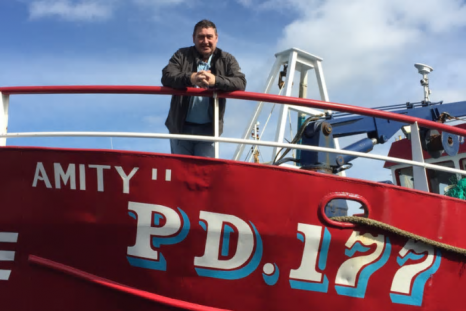
Jimmy Buchan: Embrace Brexit for the sake of fishing industry
All arguing aside, the country has made a choice. It’s a fast-moving situation as we all know with new political shockers hitting the news wires on an hourly basis. The First Minister has certainly done well over the past week to make sure she was in there good and early with a strong message that Scotland doesn’t want to be dragged out of the EU against its will. I applaud her media-savvy team on this, but what she’s guilty of forgetting is that Scotland is still in the UK, and regardless of the majority, a huge number of Scots want to leave. The UK made a decision as part of our democratic society which we should accept. My fishing industry colleagues and I don’t want a situation where we’re being dragged back into the EU against our will. Ms Sturgeon should concentrate on working with the UK government rather than against it. I started a career in the fishing industry over 40 years ago and in that time there have been huge changes. I have witnessed colleagues and friends forced out of business and lose their livelihoods, all under EU governance. Although I’ve enjoyed good and bad years, I cannot console myself that the current EU treaties work in my best interests or ever did when I have witnessed what fishing communities right around the UK have had to endure. I’m also well aware that other industries have also endured economic hardship because of EU powerhouse decisions. Read the rest here 08:47
“Divide and Conquer” – Bay of Fundy tidal project ‘transparency’ questioned
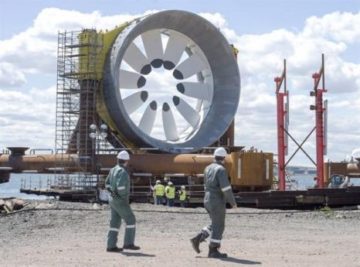 A group opposing a project to capture power from the world’s highest tides says the company installing the underwater turbines isn’t doing a good job consulting the public. Cape Sharp Tidal Venture has been approved to launch two turbines in the Bay of Fundy’s Minas Passage, home to endangered species, such as Atlantic salmon and white shark, and active fisheries. That launch is delayed pending more work on the turbines, which the company says is opportunity to consult with the fishing community, spokeswoman Sarah Dawson said in an email Saturday. But a fishermen’s group says the company won’t hold a public meeting, instead offering to meet one-on-one in a “divide and conquer” tactic. “We feel that the lack of transparency and meaningful inclusion in tidal energy development in Nova Scotia has led to all these problems,” Bay Inshore Fishermen’s Association spokesman Colin Sproul said. “We really would like to engage Cape Sharp Tidal Venture, but we just feel it’s irresponsible to do it in an off-the-record, informal manner like they’ve requested.” Read the rest here 08:03
A group opposing a project to capture power from the world’s highest tides says the company installing the underwater turbines isn’t doing a good job consulting the public. Cape Sharp Tidal Venture has been approved to launch two turbines in the Bay of Fundy’s Minas Passage, home to endangered species, such as Atlantic salmon and white shark, and active fisheries. That launch is delayed pending more work on the turbines, which the company says is opportunity to consult with the fishing community, spokeswoman Sarah Dawson said in an email Saturday. But a fishermen’s group says the company won’t hold a public meeting, instead offering to meet one-on-one in a “divide and conquer” tactic. “We feel that the lack of transparency and meaningful inclusion in tidal energy development in Nova Scotia has led to all these problems,” Bay Inshore Fishermen’s Association spokesman Colin Sproul said. “We really would like to engage Cape Sharp Tidal Venture, but we just feel it’s irresponsible to do it in an off-the-record, informal manner like they’ve requested.” Read the rest here 08:03






 Think fish study’s when you read this. Professor George J. Borjas – I have a few pet peeves. One of them is how “peer review” is perceived by far too many people as the gold standard certification of scientific authority. Any academic who’s been through the peer review process many times (as I have) knows that the process is full of potholes and is sometimes subverted by unethical behavior on the part of editors and reviewers. The reason I bring this up is because of a brewing scandal in my own discipline, economics. There has been online discussion about this for over a month, but I’ve delayed this post both because I’ve been traveling too much and because I was hoping for a resolution before I wrote anything down. But as a junior economist recently told me: “The relative silence by senior economists regarding the editorial handling of this paper has been deafening.” So here it goes.
Think fish study’s when you read this. Professor George J. Borjas – I have a few pet peeves. One of them is how “peer review” is perceived by far too many people as the gold standard certification of scientific authority. Any academic who’s been through the peer review process many times (as I have) knows that the process is full of potholes and is sometimes subverted by unethical behavior on the part of editors and reviewers. The reason I bring this up is because of a brewing scandal in my own discipline, economics. There has been online discussion about this for over a month, but I’ve delayed this post both because I’ve been traveling too much and because I was hoping for a resolution before I wrote anything down. But as a junior economist recently told me: “The relative silence by senior economists regarding the editorial handling of this paper has been deafening.” So here it goes. 